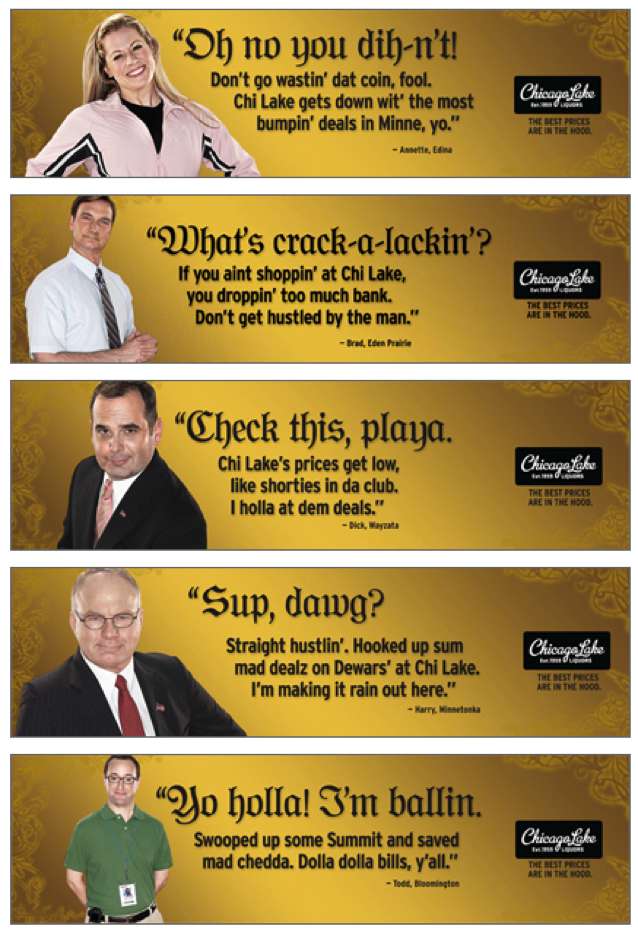
Is this series of billboards, above, coupled to a complementary set of commercials by the same company, below, racist?
As a non-drinking New Yorker, I’d never heard of Chicago-Lake Liquors, the 50-year-old, Minneapolis, MN-based retailer of wine and spirits. It was only with recent posts on Racialicious, then Kiss My Black Ads, that I became aware of their recent campaign, overseen by ad agency Brew Creative, also in Minneapolis.
In each of the three commercials, as in the billboards, white Chicago-Lake Liquors patrons, overjoyed at their savings, are moved to celebrate the buys in “hip-hop” or “ghetto” slang, or style.
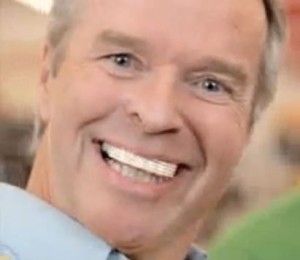 In one, after giving the cashier a pound, a white, gray-haired, bank chairman type flashes a set of diamond-encrusted fronts, right. In another, below, a pudgy white soccer dad strips down to his undershirt, dons gang colors, and tattoos his knuckles with a marker.
In one, after giving the cashier a pound, a white, gray-haired, bank chairman type flashes a set of diamond-encrusted fronts, right. In another, below, a pudgy white soccer dad strips down to his undershirt, dons gang colors, and tattoos his knuckles with a marker.
It might escape non-Minneapolitans how white these patrons are, though, until you note, in the billboards, which suburbs each model represents (and at whom, by extension, the pieces are aimed): Edina, Eden Prairie, Wayzata, Minnetonka, and Bloomington.
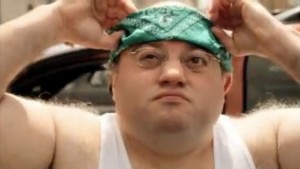 Of the five, Bloomington is both the Blackest—3.42% African-American—and the least white—88.12%. Wayzata (Why-zet-ta), home of Dick (“Check this, playa”), above, is listed on Wikipedia as “one of the top three wealthiest communites within Minnesota,” 96.11% White, 0.41% African American.
Of the five, Bloomington is both the Blackest—3.42% African-American—and the least white—88.12%. Wayzata (Why-zet-ta), home of Dick (“Check this, playa”), above, is listed on Wikipedia as “one of the top three wealthiest communites within Minnesota,” 96.11% White, 0.41% African American.
What do these ads mean, however, and why take this approach?
Kiss My Black Ads say its “just co-opted blackface.”
Simply stated; it is the minstrelization of caricatures that wrongly represent African Americans. A less than flattering imitation of an already too often accepted demoralized view of Black people in America.
Some would disagree, adding that, with the TV spots’ tagline—”At least the prices are for real”—the pieces are clearly joshing white people. To that, though, Racialicious’s guest blogger, Tami, of What Tami Said, notes
I don’t think the ads are making fun of the dominant culture, though it seems so at first. The ads are making fun of behaviors and language deemed “black” by showing white people indulging in them. They are highlighting “otherness” using the mainstream as a backdrop. If you think the joke is not about blackness, but about poking fun at urban, street lingo and style, consider why none of the ads feature a straight-laced, middle class, black guy. Why? Because all black men are expected by the dominant culture to talk jive. It’s not funny when a black person says “pimp tight” and sports gold fronts, cause you know, that’s just what we do.
In the end, though, Tami admits that
I am stymied by what message these ads are trying to send. The prices at Chicago-Lake Liquors are so low that they make even good, white folks indulge in coonery? I suspect there is no message; this is one of those aggravating campaigns that seek to raise awareness of a brand through nonsensical, “edgy” ads that draw a lot of heat for a moment in time. The flash point? Race. I have no doubt some hipsters in a Twin Cities ad agency are sitting around right now, fist bumping and congratulating themselves on a job well done. “We rock, yo!”
It’s hard for me, as well, to figure out what these spots mean. Do they, as Tami urges, possess “no message”? Are they, as Kiss My Black Ads says, just results of the “quintessential lazy day at the office…when dumb jokes go wild,” and “under-active imaginations fixate on poorly developed ideas”?
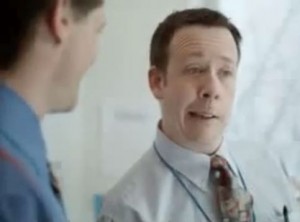 I don’t think so. I’m guessing that these ads are designed to let white suburbanites in the local Hennepin County area, right, know that it’s cool, safe, and fun to visit Chicago-Lake Liquors.
I don’t think so. I’m guessing that these ads are designed to let white suburbanites in the local Hennepin County area, right, know that it’s cool, safe, and fun to visit Chicago-Lake Liquors.
It’s hard to say this with certainty, as a New Yorker, without knowing more about the local area, or, even more, perceptions there of it, and I could be wrong. But I think the spots are making fun of concerns or misapprehensions many suburbanites may have about shopping in certain neighborhoods, even parodying things white people may have said—”I wouldn’t go there unless I was in a gang!”
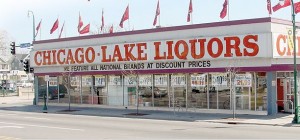 I think Chicago-Lake, right, figured they were leaving money on the table, and, with a little advertising, they could pull in a lucrative clientele that wasn’t shopping there, but would. By exaggerating that group’s fears or fantasies—whoa, going to Chicago-Lake will turn even the WASPiest patrician into a homeboy!—the ads not only get attention, but also humorously dissolve the mental obstacles prospective clients might have about shopping there. (On their web site, Minnesota’s self-described largest volume liquor retailer adds that they are “an urban wine and spirits establishment without metal bars on our windows,” whatever that means.)
I think Chicago-Lake, right, figured they were leaving money on the table, and, with a little advertising, they could pull in a lucrative clientele that wasn’t shopping there, but would. By exaggerating that group’s fears or fantasies—whoa, going to Chicago-Lake will turn even the WASPiest patrician into a homeboy!—the ads not only get attention, but also humorously dissolve the mental obstacles prospective clients might have about shopping there. (On their web site, Minnesota’s self-described largest volume liquor retailer adds that they are “an urban wine and spirits establishment without metal bars on our windows,” whatever that means.)
It’s interesting to me that none of the ads are set at night, despite the fact that this is a time during which a lot of liquor is bought. If my theory is correct, I’m guessing that suggesting to some people they go to Chicago-Lake when it’s dark could have been seen as pushing it.
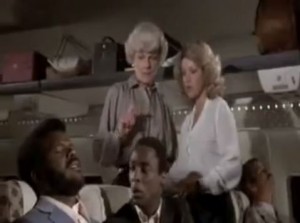 In a way, the spots remind me of of the famous “Oh, Stewardess: I Speak Jive” sequence, right, from 1980’s Airplane, in which a senior-aged white woman translates the ebonic utterings of two Black passengers. I’ve always found this scene hilarious. I did so, long before I knew that the jive translator was actor Barbara Billingsley, the mother from Leave It To Beaver—a show so white it makes Friends look like Soul Train.
In a way, the spots remind me of of the famous “Oh, Stewardess: I Speak Jive” sequence, right, from 1980’s Airplane, in which a senior-aged white woman translates the ebonic utterings of two Black passengers. I’ve always found this scene hilarious. I did so, long before I knew that the jive translator was actor Barbara Billingsley, the mother from Leave It To Beaver—a show so white it makes Friends look like Soul Train.
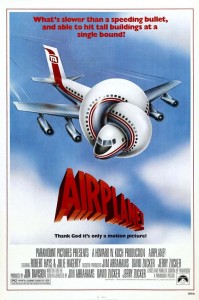 Part of what made the bit funny may have been seeing it when I was still a teen, and at an impressionable age. Airplane, right, was the first time I’d ever seen anything like that. (Check out the poster’s way pre-9/11 tag line: “Able to hit tall buildings.” Not. Happenin’.) I specifically remember cracking up loudly as soon as I saw the subtitles. Another part of the humor may have been my willingness, then, to be part of the joke, or even the object of it, before I acquired any dimension of race consciousness.
Part of what made the bit funny may have been seeing it when I was still a teen, and at an impressionable age. Airplane, right, was the first time I’d ever seen anything like that. (Check out the poster’s way pre-9/11 tag line: “Able to hit tall buildings.” Not. Happenin’.) I specifically remember cracking up loudly as soon as I saw the subtitles. Another part of the humor may have been my willingness, then, to be part of the joke, or even the object of it, before I acquired any dimension of race consciousness.
On the other hand, part of why I still think the scene is so funny is it’s set within the cohesive walls of a robust parody, one full of all kinds of plays on language. (“Can you fly this plane and land it?” “Surely you can’t be serious.” “I am serious…and don’t call me Shirley.”)
To me, the real humor wasn’t just that those dudes were being subtitled, as though we’d come across them on safari. It was that their slang was so, well, jive. It was nothing that any Black person would recognize as meaningful Black speech. The actors gave it the right rhythms, but the words were all wrong. “Pretty jay, I get the samo-samo”? Gimme a break.
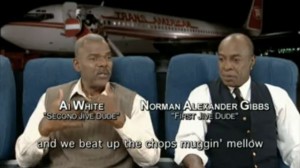 For years, I’d often thought this was my own private interpretation. But actually, in this clip—which I found while researching this very post—the actors, Al White and Norman Alexander Gibbs, right—backed by writer/directors Jim Abrahams, David Zucker, and Jerry Zucker—talk about how they put together the dialogue, forging their vision, says White, of “jive as a language,”
For years, I’d often thought this was my own private interpretation. But actually, in this clip—which I found while researching this very post—the actors, Al White and Norman Alexander Gibbs, right—backed by writer/directors Jim Abrahams, David Zucker, and Jerry Zucker—talk about how they put together the dialogue, forging their vision, says White, of “jive as a language,”
which it is not. Jive is only a word here, a phrase there. But then, when you put it all together, in a supposed language, it comes out very humorous and funny, as it did.
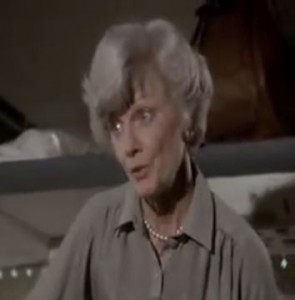 Perhaps it’s that level of wit the Chicago-Lake ads lack: Not just that some old white woman was translating Black speech, right, but that she was doing it so inauthentically, tripping over words and syllables with her insistent purr.
Perhaps it’s that level of wit the Chicago-Lake ads lack: Not just that some old white woman was translating Black speech, right, but that she was doing it so inauthentically, tripping over words and syllables with her insistent purr.
The Chicago-Lake pieces, by comparison, have one level of joke: White People Act Like Blacks. Ha Ha Ha Ha Ha. The End. No art, no nuance. It’s almost as though this denial of Black complexity—the kind which White and Gibbs clearly relish—is itself what makes the ads racist: You think so little of us that you don’t feel bound to tell a better, smarter joke.

13 comments ↓
As a black dude, I give it a pass but only after watching the second ad. It’s not really funny until the black lady comes in at the end and looks at them like they’re nuts. The reality is, we can’t really be up in arms about how we’re caricatured by others as long as we allow our own people to caricature us. (See Rhames, Ving, BET Awards, 2009) If anything, I think the ad pokes fun at the staidness and conservatism that’s supposed to represent suburban white life as much as it pokes fun at overexaggertions of blackness.
im pale but i think its still pushin the envelope a little… mayb im just a uptighty whitey
Wow. While Chicago-Lake must have approved the campaign, I wonder if they designed it or if an outside firm did, and if the latter, what company that was. I don’t get the campaign, at best they seem to be going for: they’re \funny,\ therefore you should buy booze from them?
I found them to be very funny. If we as black people continue to support our own people putting out stereotypical product then don’t get mad when someone of another race makes a parody of it. We need to clean up our own back yard and stop producing and distributing ignorance like Soul Plane and much of the wack urban music that’s saturating the airwaves.
Stop being hypocrits.
hip hop culture is mainstream now but is still considered to be, to a great degree, the domain of black folks.
these images are no secret to the general white population and yet they are still and perhaps always will be relatively out of reach for them..
therein lies the comedy.
At the same time white folks are an integral part of hip hop culture: they know the deal, aint no mystery anymore.
There are a lotta brothers out there just like this and they’re comical.
It is what it is. But it ain’t racist, its just comedy.
I wouldn’t say its racist, some of us put that stereotype out there. The ad is targeted to a niche group in the black community.
Shoot some more fish in a barrel, why don’t you? Yawn. White people have been doing this kind of pantomime with each other for years. If anything, it is a mild form of self-mockery; a jab at the self-perceived milquetoasty ethnic transparency of the “average white american”. Just ax my girl Kirstie, yo! I would love to hear that woman spit some jive with some of those “View” ladies.
obnoxious and gross…just how the ad execs like it….a memorable advertisement at any cost.
Those ads are just cringe-inducing. Worse, they really make no sense — if you try to deconstruct the message they just fall apart.
Especially the part where every minstrel-macking moment comes complete with a POC (person of color) to register their disbelief and disapproval.
And it triples-down on the weird offensiveness, as Minneapolis is a place where a lot of black folks’ speech is much closer to Broadcast Standard than it is in Atlanta or St. Louis. The whole idea that there is a unitary notion of ‘talking black’ is false.
Speaking as a South Minneapolitan, I would suggest that these ads are not aimed at Eagen, Edina or anyplace in the vast Twin Cities suburbiverse. The economic and cultural divide is just too great between the Cities and the burbs (even in a city as white as Minneapolis) for anyone in Wayzata to consider shopping there. Instead, I think these ads are an attempt to do what you say—make Chi-Lake seem cool, safe and fun—but for Mpls citizens (Uptown, downtown, Northeast) who like to laugh at suburbia but who may be intimidated by this stretch of Lake Street.
Yes these ads are racist. I’m especially feeling that with the billboards – the white folks are not even scholars who are recognizing or respecting “black vernacular english” as a dialect, they are outright mocking it and saying that is sounds truly ridiculous and unintelligent.
As you quote Tami saying, the ad promotes that black people just do that, it’s not weird. But when compared to the norm, the standard, it makes the speaker sound unintelligent and ridiculous – exactly what they are saying black people are.
In the commercials, would it be a different ending story if the black woman who ‘catches’ the white guys at the cooler was tall, wearing tall heels and a power suit, looking like she is their superior or employer?
Of course it portrays a fear of the hood. South Minneapolis has its bouje spots, but Chicago-Lake is in an area where there are metal bars on store windows (i.e. a nearby Taco Bell has bullet-proof glass up at the registers). The Liquor store is across the street from the Global Market, an expensive market of all sorts of global foods and gifts – definitely a commuter’s shop. I can see them wanting to get the business men who visit the Global Market on lunch break to stop in across the street for their liquor.
I think you make a strong point that the commercials only have shopping in day light.
So are they saying, “Come on white folks, it’s not that bad down here?” while at the same time telling the local black folk the old message of “you’re unintelligent and sound ridiculous, white folks are scared to come here, so stay in your place.”
These are sick. As a Minnesotan I will spread the word. Thanks.
i…don’t….know. honestly, the print adds felt in bad taste and just seemed stupid. but then so do many white people \acting black\ in the worst sense of appropriation and mockery (i feel like i need a disclaimer here about how i don’t think black people are stupid, which means i should rewrite that but can’t quite make it say what i want to say without feeling like i’m digging myself a hole or going to break an arm patting my own back). they make me uncomfortable but the actual tv adds seem worse to me. especially given the looks on the faces of the POC who are forced to stand by and be mocked.
i feel like, in some ways, this is all about slummin and i really dislike the implication that all POC do is drink. additionally, this has a kind of gentrification feel to it, like the affluent white folks should be lured in by the super low prices and hip edginess of the area…
additionally, i think the types of alcohol they were talking about made this worse in a way. the names mentioned are not ones i recognize as high end, or top shelf, alcohols but rather the inexpensive stuff you get because you can’t afford the good stuff. somehow i think this might have had some whit if they had been talking about high priced alcohols. to that end, i find the middle ad the most offensive, for some of the above reason.
but then i’m back to the affronted looks and i just….. i will say the adds don’t make me want to spend money there.
When I see content like this and I’m not quite sure what to think, as my mentor, Harry Allen, has taught me, I always ask a question. A question is always a good response.
Invariably, my question turns the situation around to Jewish people. In this instance, it would go something like:
“Would this be funny if the ad featured Black people using Yiddish slang?”
Answer: No.
Then it shouldn’t be OK in its current form.
Thanks to Harry for always holding a candle to the B.S.
Leave a Comment